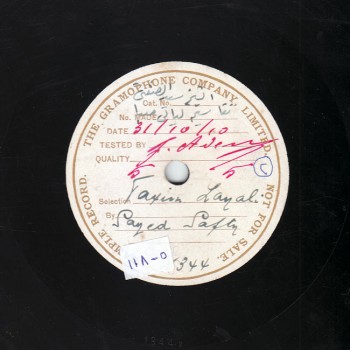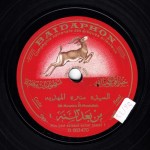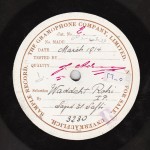The Arab Music Archiving and Research foundation (AMAR), in collaboration with the Sharjah Art Foundation (SAF), presents “Min al-Tārīkh”.
Dear listeners,
Welcome to a new episode of “Min al-Tārīkh”.
Today, we will resume our discussion about Sheikh Sayyid al-Ṣaftī with Prof. Frédéric Lagrange.
We, almost, …
Did we finish the dawr or not?
Not completely…
Are you going to sing me a mawwāl?
I will. Just play me some taqsīm layālī to accompany Sayyid al-Ṣaftī’s mawwāl.
First, here are probably some of the most beautiful layālī sung by Sayyid al-Ṣaftī. They were recorded on this demo disc that includes muwashshaḥ “Ahwa Qamaran” to the ṣabā on one side, and layālī to the ṣabā on the second side.
Beautiful indeed…
(♩)
Sayyid al-Ṣaftī is among those who recorded layālī ‘ala al-waḥda.
The continuation of “Ta‘āla yā khayāl bahgit amālī”.
True… to the ‘ushshāq.
A muwashshaḥ to the ‘ushshāq… layālī to the ‘ushshāq ‘ala al-waḥda.
It may bear a connection to Sheikh Abū al-‘Ilā. There was apparently a relation between them… they even shared similar thoughts.
(♩)
Let us stay with the maqām ‘ushshāq and with the mawwāl “Yā mālik al-rūḥ” to the ‘ushshāq.
The beautiful “Yā mālik al-rūḥ” recorded in 1907 by Zonophone…
(♩)
Sayyid al-Ṣaftī recorded a large repertoire of mawwāl to all the maqām. Those we prefer are his discs exclusively dedicated to mawwāl, notably the late ones. Even though his voice was weaker and his vocal texture had lost its “charm” as you called it, still his experience shows through his great exploitation of all the maqām’s scale-steps.
Are you referring to “Yā dhāyi’ el-nōm” to the bayyātī?
Yes, the beautiful “Yā dhāyi’ el-nōm” to the bayyātī that he sang with great mastery.
Let us listen to it…
(♩)
After these Odeon and Columbia recordings made in the late 1920s, Sayyid al-Ṣaftī stopped singing. Was it because he gave up, or because of something else?
He most probably gave up. The Syrian sources we mentioned all state that Sheikh Sayyid al-Ṣaftī was addicted to alcohol, maybe to the point where he was unable to resume his artistic career… It may have affected his voice.
Sheikh Sayyid al-Ṣaftī did not sing for the Egyptian Radio even though he died in 1939, and thus must have had the opportunity to sing for the Radio. Neither did he record for the 1932 Cairo Congress. So I think he had lost his vocal ability by the late 1920s and was then unable to perform dawr with the same infinite mastery we can witness and that characterises his performance in the early years of the century.
Indeed. He, strangely, neither sang at local radio stations, nor at the Arabic BBC, or at the Egyptian Radio.
On the other hand, did he, like ‘Abd al-Laṭīf al-Bannā, go and chant in his village. What did he do?
I do not think so. I think he was tired.
‘Abd al-Laṭīf al-Bannā had not lost his voice, whereas Sayyid al-Ṣaftī’s Odeon electrical recordings prove, as I said, that he had lost 70% of his voice. Thus he must have given up on his art.
He died discreetly in 1939.
We thank you for this great episode on Sheikh Sayyid al-Ṣaftī. Which piece by Sheikh Sayyid al-Ṣaftī shall we conclude with?
Muwashshaḥ “Qātilī bi-ghunj al-kaḥali” to the bayyātī “warashān”. Let us listen to it.
Beautiful… Barfashān in Turkish…
With this we end today’s episode of “Min al-Tārīkh”.
We thank Prof. Frédéric Afandī Lagrange.
You are most welcome.
We conclude this episode with “Qātilī bi-ghunj al-kaḥali”.
(♩)
“Min al-Tārīkh” is brought to you by Mustafa Said.
- 221 – Zakariyya Ahmed – 12 (1/9/2022)
- 220 – Zakariyya Ahmed – 11 (1/9/2022)
- 219 – Zakariyya Ahmed – 10 (11/25/2021)
- 218 – Zakariyya Ahmed – 9 (10/26/2021)
- 217 – Zakariyya Ahmed – 8 (9/24/2021)
- 216 – Zakariyya Ahmed – 7 (9/4/2021)
- 215 – Zakariyya Ahmed – 6 (8/28/2021)
- 214 – Zakariyya Ahmed – 5 (8/6/2021)
- 213 – Zakariyya Ahmed – 4 (6/26/2021)
- 212 – Zakariyya Ahmed – 3 (5/27/2021)
- 211 – Zakariyya Ahmed – 2 (5/1/2021)
- 210 – Zakariyya Ahmed – 1 (4/28/2021)
- 209 – W-al-Lāhi lā astaṭī‘u ṣaddak 2 (4/6/2017)
- 208 – W-al-Lāhi lā astaṭī‘u ṣaddak 1 (3/30/2017)
- 207 – Bashraf qarah baṭāq 7 (3/23/2017)




